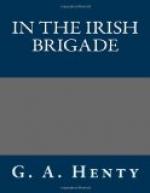O’Sullivan laughed.
“My dear fellow, if you had not gone through those adventures, I should have said that you had mistaken your vocation, and were cut out for a philosopher rather than a soldier. However, although your luck did not suffice to save the Salisbury from capture, we must still hope that it has not altogether deserted you; and anyhow, I am convinced that, if it be possible for anyone to effect an escape from this dismal place, you are the man.”
Newgate, in those days, stood across the street, and constituted one of the entrances to the city. Its predecessor had been burnt, in the great fire of 1666, and the new one was at this time less than forty years old, and, though close and badly ventilated, had not yet arrived at the stage of dirt and foulness which afterwards brought about the death of numbers of prisoners confined there, and in 1750 occasioned an outbreak of jail fever, which not only swept away a large proportion of the prisoners, but infected the court of the Old Bailey close to it, causing the death of the lord mayor, several aldermen, a judge, many of the counsel and jurymen, and of the public present at the trials.
The outward appearance of the building was handsome, but the cells were, for the most part, small and ill ventilated.
“This place is disgraceful,” O’Neil said. “There is barely room for our three pallets. The air is close and unwholesome, now, but in the heat of summer it must be awful. If their food is as vile as their lodging, the lookout is bad, indeed.”
“I fancy the cells in the French jails are no better,” O’Sullivan said. “No doubt, in the state prisons, high-born prisoners are made fairly comfortable; but the ordinary prisoners and malefactors, I have been told, suffer horribly. Thank goodness I have never entered one; but even the barrack cells can scarcely be called inviting.”
“You are learning philosophy from Kennedy,” O’Neil said, with a laugh.
“I don’t know that I shall feel philosophic, if we are served with nothing but bread and water. However, the turnkey told us that, until we have been tried and condemned, we are at liberty to get our food from outside—certainly a mockery, in most cases, considering that we all were relieved of any money found upon us, when we arrived in Harwich. It is a comfort that we are, as he said, to take our meals together, and the money we have in our boots will alleviate our lot for some time. Probably, it will last a good deal longer than we are likely to be here.”
When they joined their companions, in the room in which they were to dine, all were astonished at seeing an excellent dinner on the table, with eight bottles of wine.
“Is this the way they treat prisoners here?” Colonel Wauchop asked one of the jailers, of whom six remained present.
The man smiled.
“No, indeed. It has been sent in from a tavern outside, and with a message that a like meal will be provided, as long as you are here. One of us was sent across, to enquire as to the person who had given the order. The landlord said that he was a stranger to him, but that he had paid him a fortnight in advance, and would call in and renew the order, at the end of that time.”




